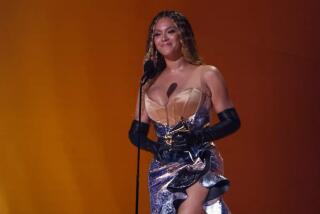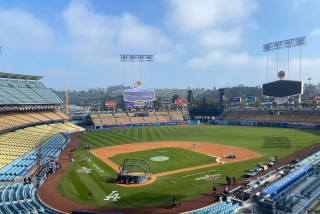How Ticket Price Adds Up
- Share via
How can a $17.50 concert ticket end up costing $26.05?
You just keep adding on service fees--almost all of which are designed to help the promoter, ticket agent or venue supplement box-office income.
Take pop singer Chris Isaak’s upcoming concert at the Universal Amphitheatre. The official ticket price for his June 2 engagement is $17.50, but you can’t buy it anywhere for that price.
If you purchase it at the Universal box office, the venue adds $2 as a facility fee, which goes to help defray maintenance and refurbishing costs that are not covered in the price of the ticket, a spokeswoman for the Amphitheatre said.
If you bypass the box office and go to a neighborhood Ticketmaster outlet, the price jumps to $22.75--which includes the $2 facility fee plus $3.25 for the “convenience” fee.
If you want to buy a single ticket by telephone, the cost can escalate to $26.05. That figure includes the $2 facility fee, a $5 phone convenience fee plus a $1.55 processing fee (the fee is per order so it wouldn’t be added to any other ticket you bought on the same order).
Don’t put your wallet away yet.
Unless you plan on walking to the Universal Amphitheatre, the cost of parking your car will add another $5 to your bill.
That can bring the total, with parking to $31.05.
Here’s how it got that way.
Because major artists working the live circuit these days command such a big slice of concert profits, companies associated with promoting and ticket distribution have implemented new avenues for generating capital.
By most accounts, about 40%--or $7 of the face value of the $17.50 ticket--is eaten up in operating expenses shared between the promoter and the venue.
Most insiders agree that about 85%, or $8.93, of the show’s profits on the $17.50 ticket are paid to the performer with the remaining 15%, or $1.57, going to the promoter.
Insiders also maintain that the facility fee, which goes to the venue, was actually implemented to avoid sharing income with performers and--much like revenue generated from parking fees--serves as a direct source of profit for venue operators.
The convenience fee is another term for service charge. Money generated by convenience fees is used by Ticketmaster to cover a wide variety of costs associated with ticket distribution.
About 15% (or 49 cents in the Isaak case) of the Ticketmaster $3.25 convenience fee is paid to venue owners to subsidize long-term, six-figure contracts signed with each facility guaranteeing Ticketmaster exclusive ticket distribution rights to the building.
Ticketmaster officials claim that about 50% of the $3.25 fee ($1.62 in this case) pays for operating expenses such as rent, payroll, telephone switching network and facility phone lines, credit card fees, programming and maintenance of computers.
Another 25% (or 81 cents) of the $3.25 convenience fee is paid to Music Plus, May Co. and other stores for acting as Ticketmaster outlets.
Although Ticketmaster would not disclose how much profit was built into each convenience charge, insiders estimate the agency earns at least 10% (or 33 cents) in profit on each $3.25 convenience fee charged.
Consumers who choose to charge tickets over the phone pay a higher “convenience” fee (in Isaak’s case, $1.75 more), which Ticketmaster said helps defer additional costs due to an elaborate telephone switching network, sales operators, local number phone-line access, credit card fees.
Those purchasing seats by phone are also charged a $1.55 “processing” fee for the entire order, which, on the average, is spread out over three tickets per call, according to Ticketmaster. The processing fee generates additional profits and covers the cost of mailing and handling of tickets.
More to Read
The biggest entertainment stories
Get our big stories about Hollywood, film, television, music, arts, culture and more right in your inbox as soon as they publish.
You may occasionally receive promotional content from the Los Angeles Times.










